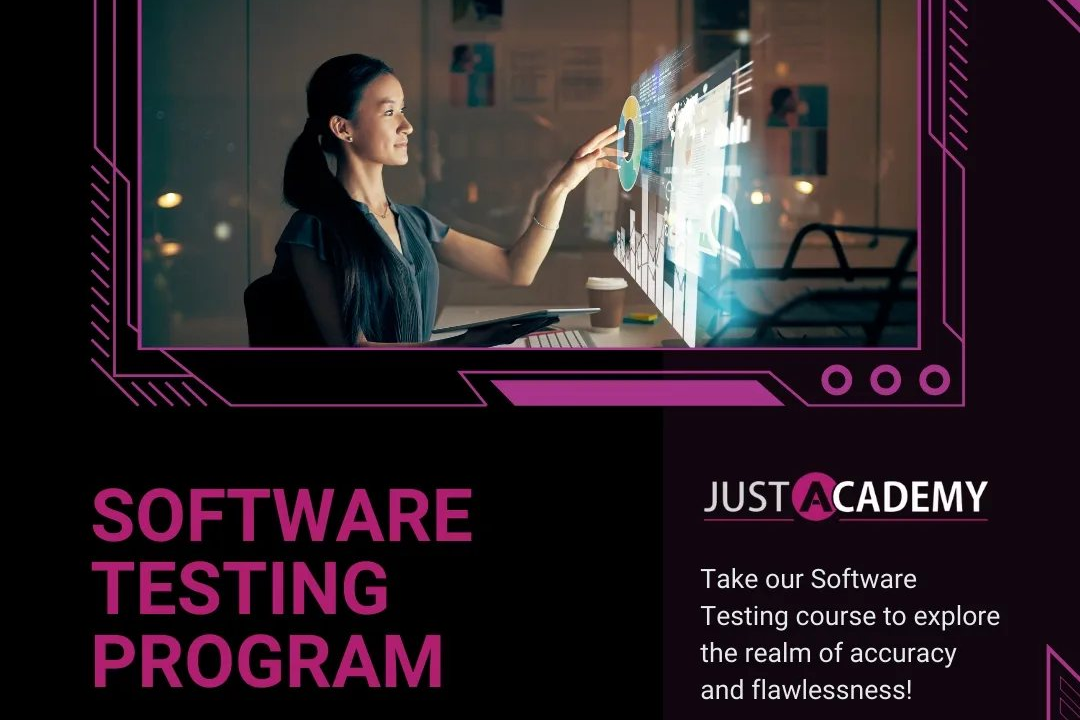Qa Manual Testing Interview Questions
QA manual testing interview questions are designed to evaluate a candidate's knowledge and understan
Qa Manual Testing Interview Questions
QA manual testing interview questions are critical for assessing a candidate's expertise in quality assurance and their understanding of the manual testing process. These questions help interviewers gauge a candidate's knowledge of testing methodologies, ability to write effective test cases, and familiarity with defect tracking tools. By evaluating a candidate’s experience with real-time projects, interviewers can determine their problem-solving skills, attention to detail, and overall readiness for a QA role. This ensures that the selected candidates possess the necessary skills to contribute to maintaining software quality and enhancing user experience, which is vital for any organization’s success.
To Download Our Brochure: https://www.justacademy.co/download-brochure-for-free
Message us for more information: +91 9987184296
QA manual testing interview questions are critical for assessing a candidate's expertise in quality assurance and their understanding of the manual testing process. These questions help interviewers gauge a candidate's knowledge of testing methodologies, ability to write effective test cases, and familiarity with defect tracking tools. By evaluating a candidate’s experience with real time projects, interviewers can determine their problem solving skills, attention to detail, and overall readiness for a QA role. This ensures that the selected candidates possess the necessary skills to contribute to maintaining software quality and enhancing user experience, which is vital for any organization’s success.
Course Overview
The “QA Manual Testing Interview Questions” course offered by JustAcademy is designed to equip aspiring quality assurance professionals with the essential skills and knowledge needed to excel in manual testing interviews. This comprehensive course covers a wide range of topics, including fundamental testing concepts, test case design, defect life cycle, and various testing methodologies. Participants will engage in real-time projects and practice answering frequently asked interview questions, enabling them to gain confidence and improve their problem-solving abilities. By the end of the course, learners will be well-prepared to tackle interviews successfully, demonstrating their proficiency in manual testing practices and methodologies.
Course Description
The “QA Manual Testing Interview Questions” course at JustAcademy is designed to prepare participants for successful careers in quality assurance by focusing on essential concepts, techniques, and strategies needed to excel in manual testing interviews. This course encompasses a range of critical topics such as testing fundamentals, test case creation, defect management, and various testing methodologies. Through engaging real-time projects and practical exercises, learners will familiarize themselves with common interview questions and best practices in the field. By completing this course, participants will develop the confidence and skills necessary to effectively showcase their knowledge in manual testing, making them stand out in competitive job markets.
Key Features
1 - Comprehensive Tool Coverage: Provides hands-on training with a range of industry-standard testing tools, including Selenium, JIRA, LoadRunner, and TestRail.
2) Practical Exercises: Features real-world exercises and case studies to apply tools in various testing scenarios.
3) Interactive Learning: Includes interactive sessions with industry experts for personalized feedback and guidance.
4) Detailed Tutorials: Offers extensive tutorials and documentation on tool functionalities and best practices.
5) Advanced Techniques: Covers both fundamental and advanced techniques for using testing tools effectively.
6) Data Visualization: Integrates tools for visualizing test metrics and results, enhancing data interpretation and decision-making.
7) Tool Integration: Teaches how to integrate testing tools into the software development lifecycle for streamlined workflows.
8) Project-Based Learning: Focuses on project-based learning to build practical skills and create a portfolio of completed tasks.
9) Career Support: Provides resources and support for applying learned skills to real-world job scenarios, including resume building and interview preparation.
10) Up-to-Date Content: Ensures that course materials reflect the latest industry standards and tool updates.
Benefits of taking our course
Functional Tools
1 - Selenium: Selenium is a widely used open source tool for automating web applications for testing purposes. It allows testers to write test scripts in various programming languages such as Java, C#, Python, and Ruby. This tool supports multiple browsers and platforms, enabling testers to validate that their applications function correctly across different environments. In the course, students will learn how to create and execute automated test cases using Selenium, enhancing their ability to efficiently manage testing processes and significantly reduce manual testing efforts.
2) JIRA: JIRA is a powerful project management and issue tracking tool commonly used in software development and testing. It helps teams plan, track, and manage agile software development projects. Students will gain hands on experience using JIRA to create and manage test cases, defects, and test results. Understanding JIRA not only equips students with skills relevant to the testing domain but also enables them to effectively collaborate with development teams and streamline their workflow, making them valuable assets in any organization.
3) QTP/UFT (QuickTest Professional/Unified Functional Testing): QTP, now known as UFT, is an automated functional and regression testing tool which is primarily used for testing desktop and web applications. With its user friendly interface and robust functionality, students will learn how to create automated scripts and run them to verify application stability. UFT's ability to integrate with various testing frameworks and its record and playback feature will be emphasized in the course, allowing learners to automate repetitive tasks and enhance their efficiency in manual testing.
4) TestNG: TestNG is a testing framework inspired by JUnit and NUnit, designed to cover a wider range of test categories. It provides powerful features such as annotations, grouping, and data parameterization, which streamline the testing process. In this course, students will learn how to structure their tests effectively using TestNG, enabling them to run tests in parallel, manage dependencies, and generate detailed reports. This framework's versatility and flexibility make it crucial for anyone looking to succeed in the QA domain.
5) Postman: Postman is a popular tool for testing APIs (Application Programming Interfaces). It enables users to send requests and receive responses, making it essential for testing the backend services of applications. The course will cover how to use Postman for various testing scenarios, including functional and regression testing of APIs. Students will learn to create collections, organize tests, and automate API testing, equipping them with important skills to validate data driven applications and ensure seamless integration of front end and back end systems.
6) SoapUI: SoapUI is a widely used tool for functional testing of web services and APIs, supporting both SOAP and REST protocols. In the course, students will explore how to utilize SoapUI for creating and executing test cases, validating responses, and conducting performance testing. With its robust features for testing web services, students will gain the knowledge necessary to address the challenges posed by service oriented architecture and ensure that clients and servers communicate effectively without issues.
By becoming proficient in these essential tools, students participating in the QA Manual Testing Interview Questions course will be well prepared for the demands of the QA industry, enhancing their employability and effectiveness in real world testing environments.
Here are additional points and tools that can further enrich the QA Manual Testing Interview Questions course, enhancing the overall learning experience for students:
7) LoadRunner: LoadRunner is a performance testing tool from Micro Focus that helps organizations determine how an application behaves under load. Students will learn to use LoadRunner to simulate virtual users, monitor system performance, and analyze application behavior to ensure scalability and reliability. Understanding how to conduct performance tests and interpret LoadRunner reports will empower students to identify bottlenecks and optimize application performance effectively.
8) QTest: QTest is a test management tool that facilitates collaboration among QA teams. In this course, students will learn to create and manage test cases, track defects, and generate reports within QTest. The platform's integration with other tools like JIRA allows for seamless workflow management and real time collaboration, making it easier to ensure that all team members are aligned on testing efforts and project progress.
9) Cucumber: Cucumber is a tool that supports Behavior Driven Development (BDD), allowing teams to write tests in plain language. Students will learn to create Gherkin syntax scenarios, automate tests using Cucumber, and collaborate more effectively with stakeholders who may not have a technical background. This hands on experience with Cucumber fosters better communication within teams and helps produce a more thorough understanding of requirements before coding begins.
10) Appium: Appium is a popular open source tool for automating mobile applications. With the rise of mobile app usage, students will gain essential knowledge in mobile testing through Appium, learning how to create automated tests for both Android and iOS applications. This knowledge will prepare students for careers in mobile app development and QA, as the ability to test mobile applications is highly sought after in today's tech landscape.
11 - Git and GitHub: Version control is crucial in any development process, and Git along with GitHub provides a robust platform for managing code changes. Students will learn how to use these tools to collaborate on testing scripts, version their test cases, and track changes over time. Understanding version control will enhance their overall software development lifecycle (SDLC) knowledge and foster skills that are valuable in any QA role.
12) Bugzilla: Bugzilla is a widely used bug tracking system that helps teams manage software defects. In this course, students will learn how to report, track, and manage defects using Bugzilla. Familiarity with bug tracking tools will enhance students' capabilities in problem resolution and their ability to prioritize defects effectively, paving the way for a more organized and systematic approach to quality assurance.
13) TestRail: TestRail is another test management tool that assists teams in managing test cases, plans, and runs. Students will learn how to use TestRail to track testing progress, report outcomes, and integrate with other tools like JIRA for comprehensive test management. Proficiency in TestRail will provide students with insight into maintaining an organized testing process, thereby improving team efficiency overall.
14) SikuliX: SikuliX is a visual automation tool that uses image recognition to automate GUI (Graphical User Interface) testing. The course will include training on how to use SikuliX to automate repetitively performed actions in applications, bridging the gap between manual and automated testing. This skill will prove beneficial for handling applications that do not have easily accessible APIs or require visual verification.
15) JMeter: Apache JMeter is a performance testing tool primarily used for testing the performance of web applications under various load scenarios. Students will gain practical knowledge on how to create test plans, analyze performance metrics, and recognize potential performance issues within an application. This skill set is essential for ensuring robust performance and a positive user experience.
16) Agile Testing: Understanding Agile principles and testing methodologies is crucial for modern QA professionals. The course will cover concepts such as Scrum, Kanban, and continuous integration/continuous delivery (CI/CD) practices. This knowledge will enable students to adapt to agile environments and participate effectively in collaborative and fast paced project teams.
By including these additional tools and concepts in the QA Manual Testing Interview Questions course, students will be further equipped to meet industry demands, excel in their roles, and enhance their career prospects in quality assurance and software testing.
Browse our course links : https://www.justacademy.co/all-courses
To Join our FREE DEMO Session:
This information is sourced from JustAcademy
Contact Info:
Roshan Chaturvedi
Message us on Whatsapp:
Email id: info@justacademy.co












